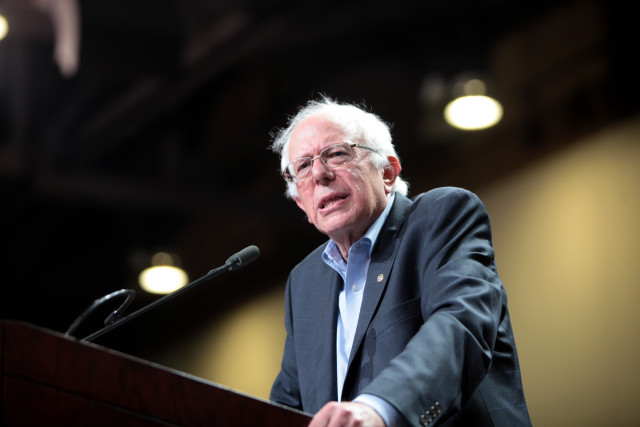
Filmmaker Michael Moore says Trump “will take us to war.” He’s afraid that centrist liberals and the mainstream media will support him like they did when Bush invaded Iraq. “Liberals and Democrats,” he regrets, “often are afraid of being accused of being wimps or weak, weak-willed, not strong, not pro-America. And so they’re so eager to just hop on, so nobody questions their patriotism.”
If Moore is right, we are in trouble because there isn’t much of a peace movement anymore. The military industrial complex is stronger than ever. We are involved in several wars right now. The sprawling U.S. empire has more than 800 military bases in over 70 nations. U.S. Special Operations are being deployed in more than a hundred countries. The military is America’s most trusted public institution today.
Paradoxically, anti-war feelings are also quite strong and the American people are receptive to a diplomatic and demilitarized foreign policy. When Obama negotiated the Iran nuclear deal and started to establish normal relations with Cuba, he was popular.
The military has become much more clever about framing its story and filtering information. Bombings in America’s many wars are secret. Wars are funded by credit card. Americans don’t like soldiers to be killed so drones and private mercenaries are used.
Daniel May argues in The Nation that the peace movement has a great deal of difficulty organizing people when there isn’t a big noticeable intervention like the Iraq War to oppose:
“A D.C.-based network loosely gathered under the ‘peace and security’ label advances a diplomacy-first approach. The anti-war base organizes against intervention. Talented organizers and very smart thinkers lead a variety of crucial institutions, but the constituency usually emerges as a political power only in opposition to large-scale interventions. There were and remain important exceptions to this trend: the anti-nuke movement and opposition to military involvement in Central America in the 1980s, and organizing against the Israeli occupation today. But over the past several decades, popular opposition to militarism has generally been confined to those moments that look like what we expect war to look like.”
May wants a peace movement that emphasizes the economic, social and political costs to Americans of the gigantic military machine. He says, “we need a movement that can speak to the anger that so many Americans feel toward the corporate powers that dominate our politics. Such a movement would expose how militarism is not immune to that influence but is particularly beholden to it.”
May says that younger activists in the new growing movements such as the Movement for Black Lives, for immigrant rights and against Islamophobia see their struggles as intertwined with a fight against militarism and empire.
What kind of a foreign policy should progressives advocate? Sen.Bernie Sanders recently offered his views in a speech at Westminster College in Fulton, Missouri.
“In my view, the United States must seek partnerships not just between governments, but between peoples,” he said. “A sensible and effective foreign policy recognizes that our safety and welfare is bound up with the safety and welfare of others around the world.”
Sanders said, “Foreign policy must take into account the outrageous income and wealth inequality that exists globally and in our own country. … There is no moral or economic justification for the six wealthiest people in the world having as much wealth as the bottom half of the world’s population — 3.7 billion people. There is no justification for the incredible power and dominance that Wall Street, giant multi-national corporations and international financial institutions have over the affairs of sovereign countries throughout the world.”
Sanders denounced America’s war on terror, calling it a “disaster for the American people and for American leadership.”
“In addition to draining our resources and distorting our vision, the war on terror has caused us to undermine our own moral standards regarding torture, indefinite detention and the use of force around the world,” Sanders said, “using drone strikes and other airstrikes that often result in high civilian casualties.”
Sanders said he disagreed with those in Washington “who continue to argue that ‘benevolent global hegemony’ should be the goal of our foreign policy, that the U.S., by virtue of its extraordinary military power, should stand astride the world and reshape it to its liking. I would argue that the events of the past two decades — particularly the disastrous Iraq War and the instability and destruction it has brought to the region — have utterly discredited that vision.
“The goal is not for the United States to dominate the world,” he said. “Nor, on the other hand, is our goal to withdraw from the international community and shirk our responsibilities under the banner of ‘America First.’ Our goal should be global engagement based on partnership, rather than dominance.”
However, he warned that “Far too often, American intervention and the use of American military power has produced unintended consequences which have caused incalculable harm.” He cited the CIA coups in Iran (1953) and Chile (1973) against democratically elected governments, which led to enormous suffering. He asked, “What would Iran look like today if their democratic government had not been overthrown? What impact did that American-led coup have on the entire region? What consequences are we still living with today?”
He proposed American intervention in the global South similar to the Marshall Plan, which rebuilt Europe after World War II. He praised the Iran nuclear deal and said the U.S. should work with the U.N.
Bernie’s ideas are so sensible that they might catch on. After all, he played a big role in shifting our domestic politics to the left. Perhaps he can do that with foreign policy as well.
This opinion column does not necessarily reflect the views of Boulder Weekly.














